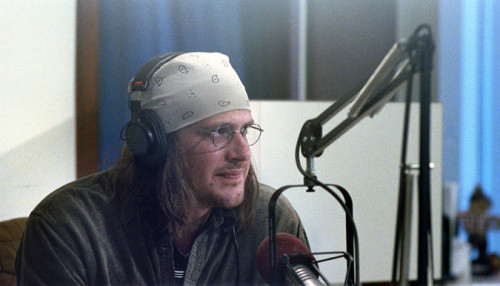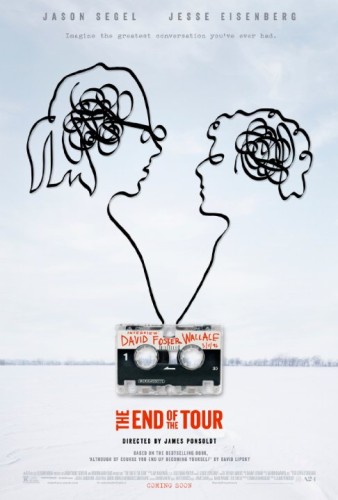There’s a certain subset of the populace that The End of the Tour, a new movie from director James Ponsoldt, is specifically designed to appeal to. During one portion of the film, David Foster Wallace (Jason Segel) describes the ideal reader for his novel Infinite Jest to writer/reporter David Lipsky (Jesse Eisenberg): white, male, upper middle class, and “obscenely well educated”.
The movie holds no illusions regarding its importance and worth – this is not a cultural plane-shifting piece of cinema, nor a commercial zeitgeist that will break all box office records. Rather, it is a film about a conversation between two writers dealing with perception, insecurity, self-gratification, and their place in the modern lexicon of literature. For a movie with such limited ambitions to succeed, it must tell its story well, pleasing its targeted audience while offending as few of them as possible. As far as those intentions go, one must call The End of the Tour a success. Even beyond those goals, it’s a charming little affirmation of all of the complexities that go into writing – anyone who identifies as a writer will find something to take from this charming little film.
The basic narrative is adapted from the book Although Of Course You End Up Becoming Yourself: A Road Trip with David Foster Wallace, a transcription of a recorded conversation between Lipsky and Wallace that takes place over a series of days. The original intention of the chat was a feature profile for Rolling Stone that was never published – in the wake of Wallace’s suicide, the book was published instead, charting a path across the upper Midwest during the last days of Wallace’s Infinite Jest book tour. You know, ground-breaking narrative interplay and stuff.
It doesn’t spoil anything to say that the movie consists of large passages of conversation from the transcripts of the book. In the hands of lesser actors and a lesser screenwriter, such a work might fall apart. Fortunately, the movie is in gifted hands. Donald Margulies, the Pulitzer Prize winning playwright, has written a deft screenplay that takes the high points of the chat and compressed them into a probing foray into the purpose of writing and of interviewing. While Lipsky is ostensibly the one holding the interview, Wallace uses his own background of doing literary profiles to turn the trip into a mutual exploration of how one is presented through the words of another.
 Wallace makes note early on that he is terrified of how he will be presented, and Jason Segel works wonders with his hulking physique. Wallace had a background as a high school jock (a fact the movie makes brief mention of), and was for all intents and purposes a massive physical presence. Until now, Segel has been mostly consigned to the realm of TV sitcoms and Judd Apatow-factory comedies. Here, he gets to use a full vocabulary of acting techniques to bring to life the do-rag clad Wallace, forever perspiring. Segel doesn’t fall into the easy trap of only focusing on Wallace’s depression, showing instead a full range and texture of emotions both physically transparent and emotionally intimate – much of the movie’s buzz regards this potentially garnering Segel an Oscar nom, and it’s fair to say that it would be well earned.
Wallace makes note early on that he is terrified of how he will be presented, and Jason Segel works wonders with his hulking physique. Wallace had a background as a high school jock (a fact the movie makes brief mention of), and was for all intents and purposes a massive physical presence. Until now, Segel has been mostly consigned to the realm of TV sitcoms and Judd Apatow-factory comedies. Here, he gets to use a full vocabulary of acting techniques to bring to life the do-rag clad Wallace, forever perspiring. Segel doesn’t fall into the easy trap of only focusing on Wallace’s depression, showing instead a full range and texture of emotions both physically transparent and emotionally intimate – much of the movie’s buzz regards this potentially garnering Segel an Oscar nom, and it’s fair to say that it would be well earned.
No conversation, however, is any good without an equal sparring partner, and Eisenberg makes for a fascinating Lipsky. Making use of his own well-practiced range of neurotic insecurity, Eisenberg flip-flops with expert timing between fawning awe of Wallace’s genius and seething jealousy and self-loathing of being unable to play on the genius writer’s level. The movie’s climax comes about as Lipsky turns on his interview subject, accusing him of holding back and presenting a false image for the purpose of playing down to the interviewer’s mental level. Viewers alternately feel pity and contempt for the man holding the microphone.
Were this solely a movie centered around two people talking, it would be unbearable to watch. Fortunately, Ponsoldt makes full use of the two actors to tell a story, not content in only transporting their words to celluloid. Interplay between Wallace and Lipsky reveal not only the emotions and inner traumas that generate the words, but their effect (intentional or otherwise) on the other person. That sense of affectedness makes for a progression between the two men, who venture across the full spectrum of mutual colleagues, professor and pupil, road trip buddies, and sparring partners. This is no typical road-trip buddy comedy; there is no sense of completion at the end of the tour, only a realization that time has run out. Side B of the cassette tape has spooled out.
The movie is not without weaknesses. No filmmaker would be able to make a film of this nature relying only upon the transcripts of Lipsky’s tome. Some sense of narrative spice must be added – this is the 21st century, and a horde of Segel fans must be appeased with dramatic tension, after all. Because of this, Margulies and Ponsoldt have added a minor love triangle to the movie that really has no place being there at all. (Full disclosure: I’ve read Ponsoldt’s book, and while I can’t claim this with 100% certainty, I don’t recall the events of this triangle taking place. Commentators, inform away.) If anything, it serves to make the character of Wallace – beloved by a certain literary generation beyond measure – seem petty and jealous. He’s already a well-layered character in this film; adding in rote narrative trends only serves to identify the limitations of the narrative at hand. “Hey, we don’t have much to do, so let’s throw in an ex-girlfriend. That’ll bring ’em in.”
Fortunately, the film doesn’t suffer too greatly for this one (albeit fairly sizable) storytelling slip-up. The cinematography highlights the flat bleakness and beauty of the Midwest. It’s a flat plain covered by snow and pine trees, and evocative beyond measure. Meanwhile, the minimalist score by Danny Elfman (!) never intrudes upon the film – rather it complements the canvas of the film, allowing the actors to take center stage as they proceed across this blank canvas via plane and rental car. One of the most compelling images comes when Lipsky crashes in Wallace’s guest room, surrounded by stacks upon stacks of Infinite Jest, looming over and threatening to crush him in all of his puny insignificance.
The final scenes don’t shy away from the fact that Wallace’s depression ends in suicide – it’s mentioned at the beginning, mentioned throughout, and remarked at the finale when we see Lipsky eulogizing the late writer at a book reading. Segel’s finest moment comes when he barges into Lipsky’s room at night to clarify an earlier point. I won’t spoil the nature of that conversation, but as one who’s suffered from depression at various points in my life, the words of David Foster Wallace as performed and embodied by Segel echoed in my mind long after I walked out of the theater. It’s a truly haunting moment.
At the end of the day, this movie isn’t going to change the face of cinema. It’ll make its token $30 million at the box office before disappearing until awards season. However, it’s a refreshing breath of air when compared with bloated superhero tripe that isn’t as Fantastic For the cinema as it’s been made to seem (see what I did there?). If the film does nothing else, it successfully identifies all of the insecurities and discomforts that come with writing, the constant fear of perception, craving for acceptance, rejection of failure, and all consuming loneliness that resides in the back of the head of anyone who’s ever tried to make sense of the world by putting it down in words on paper.
(Footnote: Pay attention during the book signing scene in Minneapolis. If you should see a red-headed woman getting her copy of Infinite Jest signed, know that you’re seeing my college friend and theatre-fraternity God-Big Jennifer Holman making her big screen debut. Congrats, Jenn! #FalconPride #TAP #shamelessplug)








“FLARGLE-BARGLE! I want to see this movie SO badly” said the white, male, upper-middle class Bowling Green educated person!